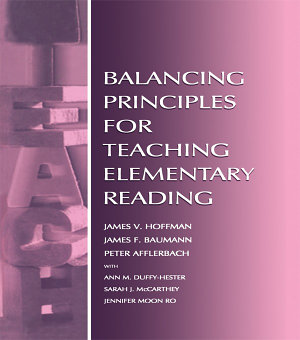Balancing Principles for Teaching Elementary Reading
Apr 2014 · Routledge
Ebook
128
Pages
family_home
Eligible
info
reportRatings and reviews aren’t verified Learn More
About this ebook
This book appears at a time when the crisis rhetoric about schools, teaching, and learning to read is extremely high. There is a rising call within the profession for a balanced perspective on reading. Balancing Principles for Teaching Elementary Reading aspires to help set the agenda for improving the quality of literacy instruction in the United States--by recentering the debate from "What's better, 'whole language' or 'phonics'?" to "What can we do in reading instruction to prepare all children for the literacy demands of the next century?"
The authors, all members of the professional community of reading educators, work on a daily basis with teachers in classrooms, prospective teachers, clinicians, and tutors. Their goal for this book is to represent what they have learned about effective teaching and learning as members of this community. It is written with four purposes in mind:
* to offer a principled conception of reading and learning to read that is considerate of both the personal dimensions of literacy acquisition as well as the changes that are taking place in society,
* to summarize key findings from the research that relate specifically to effective teaching practices,
* to describe current practices in reading instruction with specific comparisons to the principles of effective practice that are identified, and
* to suggest an action agenda that is school-based and designed to promote positive changes in the quality of instruction.
This text offers a perspective for teaching that provokes members of the reading education community to think about their underlying beliefs about teaching and their shared commitment to making schools more effective for the students they serve. It is envisioned as a resource to be used in building a community of learners--to be read with professional colleagues in a course of study, in a teacher-researcher book club, or in some type of in-service setting. Readers are encouraged to debate the ideas presented, to challenge the authors' conceptions with their own reality, to make sense within a community about what action is desirable. Some specific suggestions and strategies are provided as springboards for further exploration and action.
The authors, all members of the professional community of reading educators, work on a daily basis with teachers in classrooms, prospective teachers, clinicians, and tutors. Their goal for this book is to represent what they have learned about effective teaching and learning as members of this community. It is written with four purposes in mind:
* to offer a principled conception of reading and learning to read that is considerate of both the personal dimensions of literacy acquisition as well as the changes that are taking place in society,
* to summarize key findings from the research that relate specifically to effective teaching practices,
* to describe current practices in reading instruction with specific comparisons to the principles of effective practice that are identified, and
* to suggest an action agenda that is school-based and designed to promote positive changes in the quality of instruction.
This text offers a perspective for teaching that provokes members of the reading education community to think about their underlying beliefs about teaching and their shared commitment to making schools more effective for the students they serve. It is envisioned as a resource to be used in building a community of learners--to be read with professional colleagues in a course of study, in a teacher-researcher book club, or in some type of in-service setting. Readers are encouraged to debate the ideas presented, to challenge the authors' conceptions with their own reality, to make sense within a community about what action is desirable. Some specific suggestions and strategies are provided as springboards for further exploration and action.
About the author
James V. Hoffman The University of Texas at Austin James F. Baumann University of Georgia Peter Afflerbach The University of Maryland With Ann M. Duffy-Hester University of North Carolina at Greensboro Sarah J. McCarthey The University of Illinois-Champaign-Urbana Jennifer Moon Ro University of Georgia
Rate this ebook
Tell us what you think.
Reading information
Smartphones and tablets
Install the Google Play Books app for Android and iPad/iPhone. It syncs automatically with your account and allows you to read online or offline wherever you are.
Laptops and computers
You can listen to audiobooks purchased on Google Play using your computer's web browser.
eReaders and other devices
To read on e-ink devices like Kobo eReaders, you'll need to download a file and transfer it to your device. Follow the detailed Help Center instructions to transfer the files to supported eReaders.







